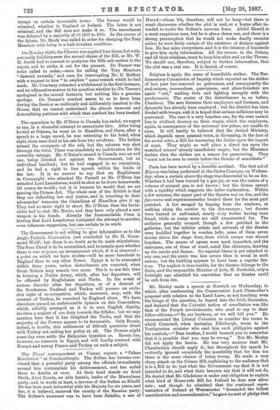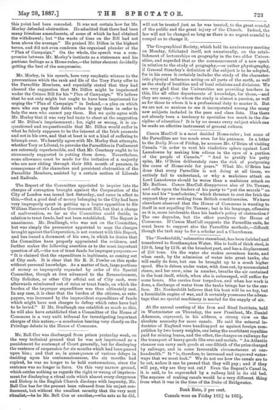Mr. Morley made a speech at Norwich on Wednesday, in
which, after condemning the Conservative Lord Chancellor's proposal with relation to the Land Laws, as not touching even the fringe of the question, he lapsed into the Irish discussion, and declared that the Unionist notion of conciliation was like that of the French revolutionists, who used to say to their fellow-citizens,—" Be our brethren, or we will kill yort." He recommended the Liberal Unionists to consider the terms in which Cromwell, when besieging Edinburgh, wrote to the Presbyterian minister who sent him such philippics against his conduct,—" Dear brother, I would beseech you to remember that it is possible that you may be wrong." But Mr. Morley did not apply the lesson. He was very anxious that Mr. Chamberlain should apply it; but throughout his speech he evidently ignored completely the possibility that for him too there is the same chance of being wrong. He made a very sharp attack on the Crimes Bill, explaining to the audience that it is a Bill to do just what the Government say that it is not intended to do, and what their lawyers say that it will not do. He denied that Mr. Gladstone is under any obligation to explain what kind of Home-rale Bill for Ireland he does now advo- cate; and though he admitted that the continued repre- sentation of Ireland at Westminster "demanded the fullest consideration and reconsideration," he gave no sort of pledge that
this point had been conceded. It was not certain bow far Mr. Morley defended obstruction. He admitted that there had been many frivolous amendments, of some of which he had obtained the withdrawal ; but "the waste of time on the Bill had not been above the average." He praised Mr. Dillon in the highest terms, and did not even condemn the organised plunder of the 'Plan of Campaign." On the whole, the speech was a com- promise between Mr. Morley's instincts as a statesman and his partisan feelings as a Home-ruler,—the latter element decidedly getting the best of the compromise.



































 Previous page
Previous page